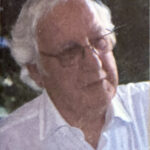People of my generation were born in the Depression years, were school kids during World War II, and lived through post-war shortages. After the war, we still had shortages of building materials, appliances, new automobiles, etc. This was because we were helping much of the world recover from the war, including Russia, Germany, and Japan. By that time, my generation was quite used to rationing and shortages: shortages of money in the depression years, and a shortage of money and goods during the war.
But here’s the thing, we didn’t think of ourselves as poor. We were just like everybody around us. We were getting by, making do by mending our clothing, wearing hand-me-downs (I remember growing out of a favorite coat that was carefully cleaned and set aside; it would do just fine for my brother Jim in a pair of years).
We stretched our food budget by raising a victory garden, canning, drying, and pickling when foods were plentiful against a time when they were not. We were getting by, but no Caribbean cruises, no student loans for college, no flying home for Thanksgiving, and no mink coats.
I suppose we were fortunate in some ways; there were few snack foods, few prepared foods of any kind. We cooked with basic ingredients.
How did we manage? In 1942, when I was 10 years old, my father worked at the Mare Island Shipyard in Vallejo, Calif. He’d been in that job for two years and was foreman for several rigging crews that worked on damaged ships. My mother kept house, raised three boys (Father worked most days), and tried to turn out nutritious and tasty meals using our food rationing book, which had a set number of stamps for various classes of food. Even though we lived in California, it was sometimes hard to get vegetables; many families had a victory garden and that helped some.
I was the oldest, so Mother told me what she needed, and I would take the list and some money, and walk a mile or so to a small country market. Due to shortages, I would often walk back with half the list filled. She might send me back with an alternate plan. Eggs were often in short supply, and butter was never available. You could only get a half dozen eggs at a time, but if you went back, as I did, you could get another half dozen. There were four of us to feed and meat was often scarce. “Butter” was actually margarine, and it came with a little packet of coloring so it would look like butter (my brothers liked the job of mixing the color into the substitute). Nobody was fooled by the coloring, but we made do.
My father was an avid fisherman and on his rare days off, he would take me fishing. An old man owned a fishing pier that reached out 100 feet into the Carquinez Straits. It was good fishing. He would charge us 25 cents to use his pier, but we took catfish, flounders, and striped-bass home with us and usually shared with neighbors, though we rarely shared the flounders. Yumm.
A word here on the use of private vehicles: gas was frozen at 17 cents a gallon, but we didn’t go far because our ration card only allowed us three gallons a month. Of course, doctors and people who produced food had a different ration card. It didn’t matter much, tires were not as tough as they are now, and you could not buy a new one. Used tires were expensive. If you had a trip planned, you might borrow a neighbor’s spare tire (it helped if you gave him fish). One thing and another, our ’36 Chevy stayed parked at 198 Sims Avenue most of the time.
These are different times, but the basic needs are still there: food, housing, clothing and transportation. I hope you can use some of our generation’s stories to help your budget. Use basic ingredients in your cooking, and cars are a huge expense (payments, fuel, maintenance, and insurance). Can you cut a car out of your fleet? Carpool? Reduce shopping trips by better planning? Can you cut out snacks, power drinks, and cell phones? Maybe you can clean out the chicken house. Get that going or plan to enlarge the garden next year?
I didn’t say it would be easy, but I have faith in you. I’d wish you good luck, but good planning is better.
Ray Bilderback, creator of the Reuben Braddock novels, was born and raised in the Sierra foothills of California. He served in the U.S. Navy Seabees during the Korean War and taught for many years in the west. He makes his home in the mountains of eastern Washington with his archeologist wife, Madilane Perry. “In the 1930s and 1940s, where I lived, we still used horses and hand tools, canned and preserved what we grew or raised, lit our kerosene lanterns, stoked our woodstoves. In my writing, I draw from those times like water from a sweet well.”

